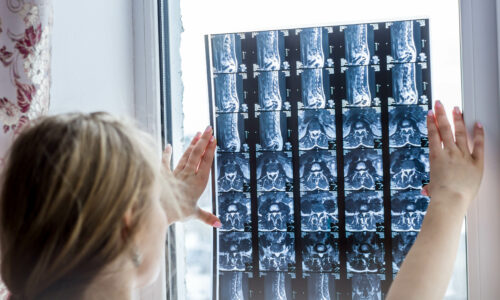Call today and speak to a member of our team. Find out if you can claim compensation.
CALL 0800 083 5500
Testicular cancer is one of the most treatable forms of cancer seen in the UK, but a testicular cancer misdiagnosis can cause unnecessary pain, suffering and long-term, serious health implications for which you may be able to claim compensation.

Conventional medical wisdom now dictates that early diagnosis and a prompt start to treatment vastly improves a patient’s prospects of surviving cancer. As such, any situation wherein the actions or failures of medical professionals have obstructed or delayed a diagnosis and / or the treatment process could entitle you to testicular cancer misdiagnosis compensation. Some of the more common instances where this is the case can include the following:
This is not intended as an exhaustive list of all potential scenarios where you may be able to claim compensation for testicular cancer misdiagnosis. If you feel the care you have been provided through the diagnostic process and subsequent treatment has fallen below an acceptable standard it’s important that you seek expert legal advice as soon as possible to discern whether or not you could make a claim.
Blackwater Law medical negligence solicitors are recognised by the Legal 500 as one of the South East’s leading solicitors in helping clients recover damages when they are provided with substandard care. Our team can offer a wealth of experience and knowledge in dealing with claims for testicular cancer misdiagnosis, so even if you are not sure whether you qualify we’d like to hear from you. Time restrictions may apply to your case however, so it’s important to get in contact as soon as possible.
We understand the devastating impact a testicular cancer misdiagnosis can have on you and your family, and the enormous financial pressures that can come to bear on your home when you’re forced to take time off work for treatment. That’s why we undertake all of our client’s medical negligence compensation claims – including those for testicular cancer – on a no win, no fee basis.
If we don’t win your case you’ll never pay us a penny – and what’s more our fees are always capped according to strict government regulations. The amount of compensation you could potentially receive however is subject to no upper limit; ensuring you always get a fair deal and that your money is never at risk.
Testicular cancer can manifest in a variety of different ways, with classification occurring on the basis of which type of cell the cancer is originally identified in.
Representing around 95% of all testicular cancer diagnoses, Germ Cell Testicular cancer originates in cells that the body uses to create sperm. Within this type of testicular cancer there are also two subdivisions:
Other less common types of testicular cancer are known to include:
There is no definitive way to tell exactly who will or will not develop testicular cancer, but there are certain groups of men who are at greater risk than others:
Doctors are now well-advised as to the risks and the various signs associated with various cancers, and should be making every effort to diagnose testicular at an early stage, so as to improve your treatment prospects.
Upon presenting to your GP with symptoms that might potentially indicate testicular cancer, a physical examination should immediately take place. In the initial stages a small light may be held against your testicles, and your GP will discern whether or not it can pass through any identified lumps (where it cannot, this is an indication of cancer).
If your GP remains concerned that you may have testicular cancer, they should refer you to a hospital-based specialist for further testing. This may include the lies of:
At each and every stage the doctors responsible for administering your care should proceed with the utmost care and attention to detail. Where medical staff fail to correctly or promptly observe signs of cancer, or to take the appropriate action thereafter, you may be entitled to claim testicular cancer misdiagnosis compensation as a result.
The way in which your testicular cancer is treated can depend on a number of factors, including exactly which kind of cancer you have, your age, preferences and the state of your general health.
The primary option for addressing all forms of testicular cancer is to surgically remove the affected testicle and any cancerous cells with it. This operation is known as an orchidectomy, and whilst unsightly / uncomfortable it should not affect your sex life or your ability to father children.
Chemotherapy is an aggressive treatment that utilises powerful medicines to attack, inhibit and destroy cancerous cells. It is also commonly used as a means of preventing the return of cancer after your tumour is removed. Chemotherapy treatments have been known to attack healthy cells as well, and are generally quite unpredictable in terms of their side effects. Some of the most are known to include vomiting, hair loss, nausea and loss of appetite, with kidney damage, low blood count and breathlessness also observed in many patients.
Some forms of cancer may require a course of radiotherapy treatment post-surgery to ensure the total elimination of cancerous cells. It may also be applicable in stances of advanced-stage cancer where your body is unable to tolerate the complex medications involved in chemotherapy. Side effects of radiotherapy are known to include soreness / redness of the skin, lethargy, diarrhoea or nausea.
Supplementary treatments may later be required to correct some of the side effects associated with some treatment paths, or to address cancerous cells spreading to other areas of the body. These can include lymph node and lung surgery where advanced-stage testicular cancer has spread to the lungs, testosterone replacement therapy where your remaining testicle is unable to provide the necessary levels of testosterone or sperm banking in instances where your fertility may be at risk.
A testicular cancer misdiagnosis can mean you require a lot more treatment, or a form of treatment you might not otherwise have required which brings with it additional suffering in the form of its side effects. This will be taken into account during the course of any testicular cancer misdiagnosis claim you do decide to make, and could affect the amount you are likely to receive.
The legal experts here at Blackwater Law specialise in dealing with claims where patients have been let down by medical staff as regards the diagnosis and treatment of cancer in all its forms. We handle claims relating to lung cancer, bowel cancer, testicular cancer and more, so if you have been the victim of substandard care we’d like to help you today.
I would recommend Blackwater Law to anyone, even If they just need advice.
Blackwater Law medical negligence solicitors acted for Mr L in a medical negligence claim in the High Court after he was misdiagnosed. The misdiagnosis meant he went on to suffer a serious stroke-causing life-limiting disability.
